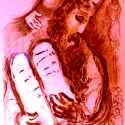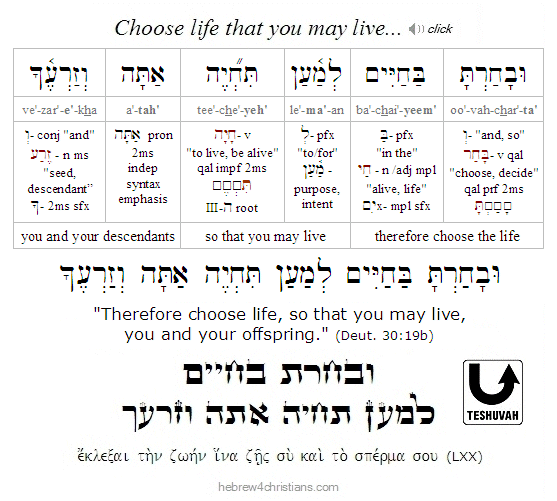|
|
|||||||||||||||||||||
 |
|||||||||||||||||||||
 |
|||||||||||||||||||||
|
|
||||||||||||||||||||||||||||
|
In our Torah portion this week (parashat Nitzavim) we note that we are constrained by God to choose either "the blessing or the curse," and that we are not free not to choose, since the LORD God created us to make that very choice... In other words, teshuvah is not optional: we cannot choose not to choose; we cannot "opt out" of our responsibility before God. Every human being faces the holy dilemma, and there is no way to avoid the "either/or" by attempting to somehow unite heaven and hell. Spiritually, we must learn to "choose to choose," since denying the power of our choice (e.g., by rationalizing, blaming others, playing the victim) means repudiating our identity as a soul made in the image of God, and this results in being inwardly "disfigured" and fragmented... Since our life is the expression of our choices, the goal of life is to unify the heart's affections, to consolidate the power of the will, and to freely yield to the truth of God. The so-called "freedom" the world offers is really the freedom from responsibility, that is, the evasion of conviction and abandonment of the truth. Real freedom is the power to choose righteousness rather than to slavishly follow the lusts and fears of the lower nature. This is a miraculous freedom given by Yeshua, who alone gives us authority over the yetzer hara and all the power of the devil (John 8:36; Luke 10:19; Heb. 2:14; 1 John 3:8). הַעִידתִי בָכֶם הַיּוֹם אֶת־הַשָּׁמַיִם וְאֶת־הָאָרֶץ ha·ee·doh·tee bah·khem hai·yohm et-ha-shah·ma'·yeem ve'et hah·ah'·retz "I call heaven and earth to witness against you today, that The choice is yours - and yours alone - to make. "See, I am setting before you today a blessing and a curse..." Note that the expression "before you" (לִפְנֵיכֶם) implies that we have real choice and free will (bechirah chofshit). Belief in free will coheres with the revelation of God's righteousness, since punishment is fitting only when a person has a genuine choice between doing right and wrong. As Abraham said, "Shall not the Judge of all the earth do what is just?" (Gen. 18:25). Likewise the idea of reward is meaningless if God simply decreed who was to be saintly and who was not. Indeed, the validity of moral choice is implied in the imperatives found in Scripture – "ought implies can." As Yeshua said, "Repent (i.e., shuv: turn to God) - and believe the good news" (Mark 1:15; Rev. 2:5). On Judgment Day, I like everyone else, will be allowed to hang all my unhappiness and suffering on a branch of the great Tree of Sorrows. Then, when I have found a limb from which my sorrows can dangle, I will walk slowly around that tree. Do you know what I will do on that walk? I will search for a set of sufferings I might prefer to those I have hung on the tree. But search as I may, I will not find any, and in the end, I will freely choose to reclaim my own personal set of sorrows rather than that of another. I will leave that tree wiser than when I got there, and I will be ready to walk toward the Tree of Life. (Hasidic Tales: Baal Shem Tov). But be encouraged, chaverim. We are promised great help as we obey the message of Yeshua and walk by faith in God's unfailing love.... Those who are in relationship with the LORD through Yeshua are given the Holy Spirit (רוּחַ הַקּדֶשׁ) in the role of Comforter (παρακλητος), who gives us strength to persevere in the midst of the storms of this life (John 14:26; 15:26). Nonetheless, the central commandment remains: We must continually choose to trust in God's love and grace for our lives, every step of the way. God will never leave you nor forsake you (לא יַרְפְּךָ וְלא יַעַזְבֶךָּ), but He continues to say to those who trust in Him: "Behold, I have stood at the door and knocked. If anyone hears my voice and opens the door, I will come in to him and eat with him, and he with me" (Rev. 3:20). Set the LORD always before you so that you will remain unmoved, chaverim. |
|
Hebrew for Christians |
|||||
|
|||||

